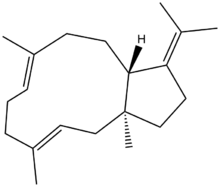Chemistry:Beta-Araneosene

| |
| Names | |
|---|---|
| Preferred IUPAC name
(3aS,6E,10E,12aS)-6,10,12a-Trimethyl-3-(propan-2-ylidene)-1,2,3,3a,4,5,8,9,12,12a-decahydrocyclopenta[11]annulene | |
| Other names
Dolabellane
| |
| Identifiers | |
3D model (JSmol)
|
|
| ChemSpider | |
PubChem CID
|
|
| UNII | |
| |
| |
| Properties | |
| C20H32 | |
| Molar mass | 272.476 g·mol−1 |
Except where otherwise noted, data are given for materials in their standard state (at 25 °C [77 °F], 100 kPa). | |
| Infobox references | |
β-Araneosene is a molecule first isolated in 1975 from the mold Sordaria araneosa by Borschberg.[1] This unprecedented diterpene framework was given the name “araneosene”. In 1976, the skeletal class was renamed to “dolabellane” due to the isolation of several compounds containing this framework found from the sea hare Dolabella californica.[1] Since their initial discovery, there are now more than 150 known dolabellanes, mostly isolated from marine sources.[1][2]
Biosynthesis
The exact biosynthesis of β-araneosene is not known, however like other diterpenes, it is assumed to originate with geranylgeranyl pyrophosphate.[3] The pyrophosphate dissociates to generate an allylic cation at the tail of the molecule. Next a cascade of cyclizations yields the stable β-araneosene-15-yl cation. Finally, elimination of the adjacent proton yields β–araneosene. It has been proposed that other diterpenes including fusicoccanes, dolastanes, and neodolabellanes also proceed through these intermediates.[1]
References
- ↑ 1.0 1.1 1.2 1.3 Rodríguez, Abimael; González, Ramírez (1998). "The Structural Chemistry, Reactivity, and Total synthesis of Dolabellane Diterpenes". Tetrahedron 54 (39): 11683–11729. doi:10.1016/s0040-4020(98)83033-0.
- ↑ Rodríguez, Abimael D.; Wei, Xiaomei; Baran, Peter; Raptis, Raphael G. (28 May 2010). "Dolabellane-Type Diterpenoids with Antiprotozoan Activity from a Southwestern Caribbean Gorgonian Octocoral of the Genus". Journal of Natural Products 73 (5): 925–934. doi:10.1021/np100074r. PMID 20384296.
- ↑ Dewick, Paul M. (2009). Medicinal natural products : A biosynthetic approach (3rd ed.). Chichester: A John Wiley & Sons. ISBN 978-0470741672.
 |


